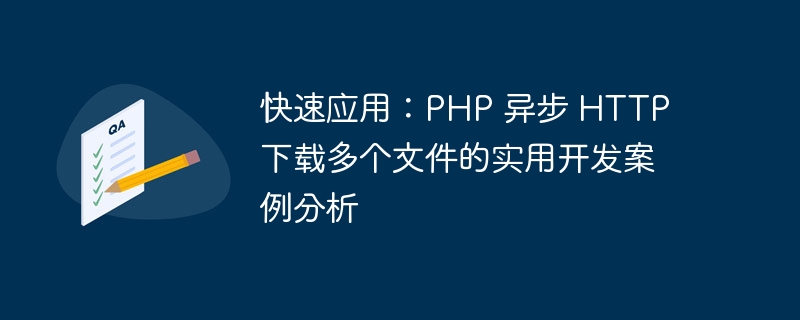

Quick Application: Practical Development Case Analysis of PHP Asynchronous HTTP Download of Multiple Files
With the development of the Internet, the file download function has become a must for many websites and applications. One of the basic needs. For scenarios where multiple files need to be downloaded at the same time, the traditional synchronous download method is often inefficient and time-consuming. For this reason, downloading multiple files using PHP asynchronous HTTP is becoming an increasingly common solution.
This article will use an actual development case to analyze in detail how to use PHP asynchronous HTTP to download multiple files.
First, let’s start with the preparations. In actual development, we need to ensure that the server environment supports asynchronous requests and that PHP related libraries and extensions have been installed correctly. In this example, we will use the Guzzle HTTP client library, a powerful PHP HTTP request library. You can add it in Composer like this:
composer require guzzlehttp/guzzle
Next, let’s create a PHP file and bring in the Guzzle HTTP client library using the following code:
require 'vendor/autoload.php'; use GuzzleHttpClient;
Now, we You're ready to start writing asynchronous code that downloads multiple files. Suppose we need to download three files, namely file1.jpg, file2.jpg and file3.jpg. We can do this using the asynchronous request method of the Guzzle HTTP client library.
First, create an asynchronous function to download the file. Inside the function, we use the Guzzle HTTP client library to send an asynchronous HTTP request and specify the path to save the downloaded file. The code looks like this:
$downloadFileAsync = function ($client, $url, $savePath) { $response = $client->requestAsync('GET', $url, [ 'sink' => $savePath ])->wait(); };
Then, create a Guzzle HTTP client instance and initialize the directory where the files are saved. The code is as follows:
$client = new Client(); $saveDir = './downloads/'; if (!file_exists($saveDir)) { mkdir($saveDir, 0777, true); }
Next, we use the multi-threading feature of PHP to implement asynchronous downloading. In this example, we use pthreads, PHP's multi-threading extension. First, create a thread pool and set the maximum number of threads. Then, use a thread pool to download the file asynchronously. The code is as follows:
$pool = new Pool(3); $pool->setSize(3); $downloadUrls = [ 'https://example.com/file1.jpg', 'https://example.com/file2.jpg', 'https://example.com/file3.jpg' ]; foreach ($downloadUrls as $url) { $pool->submit($downloadFileAsync, [$client, $url, $saveDir . basename($url)]); } $pool->shutdown();
With the above code, we use the thread pool to asynchronously download three files. Each file will be saved in the specified directory and named with the file's original name.
Finally, we can execute the PHP file in the browser and observe the download progress. As you can see, multiple files start downloading at the same time, and the download speed is very fast. This is an actual development case of PHP asynchronous HTTP downloading of multiple files.
In summary, using PHP asynchronous HTTP to download multiple files can greatly improve download efficiency and user experience. Through the practical development case analysis in this article, we learned how to use the Guzzle HTTP client library and the multi-thread extension pthreads to achieve this functionality. I hope this article can help you achieve a more efficient file download function.
The above is the detailed content of Quick Application: Practical Development Case Analysis of PHP Asynchronous HTTP Download of Multiple Files. For more information, please follow other related articles on the PHP Chinese website!